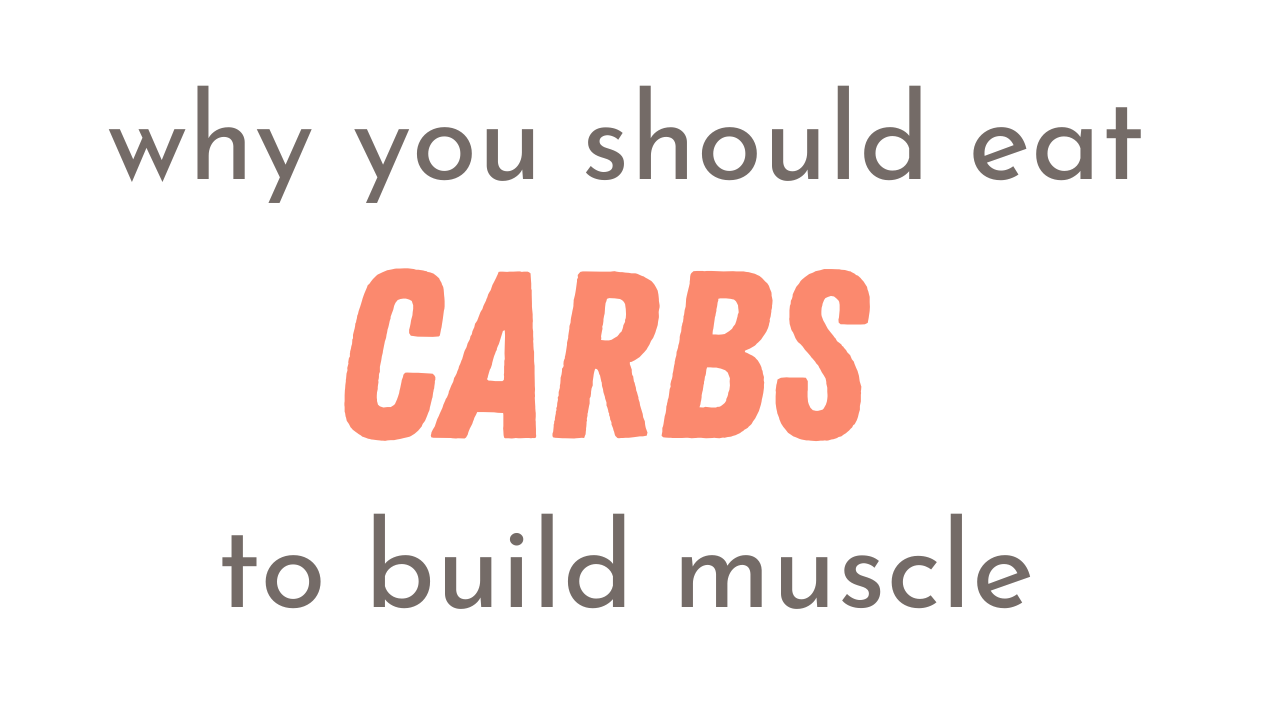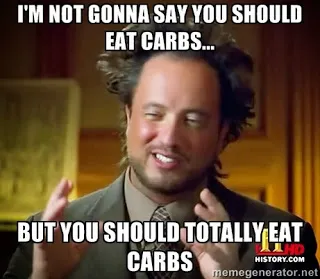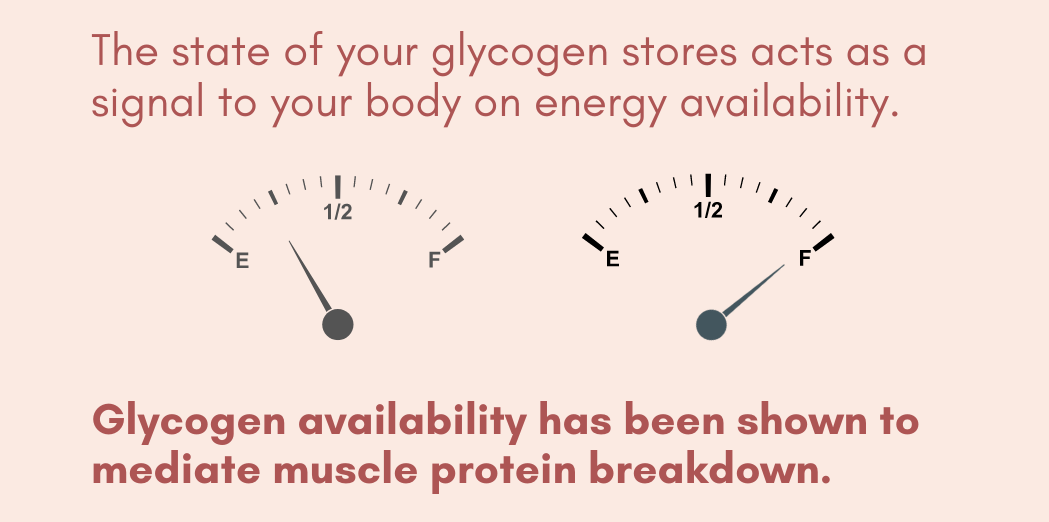Why you should eat carbs to build muscle.
Jan 26, 2023
In previous posts we've discussed the literature supporting the numerous health benefits of having muscle mass. More muscle = more fat burned at rest, higher metabolic rate, improved body composition, improved glucose utilization & insulin sensitivity, improved LDL Cholesterol clearing, reduced risk of cardiovascular disease, improved mental health, increased bone mineral density, and enhanced physical function.
In other words, thriving, not surviving.
Without strength training and proper nutritional support, humans are really good at losing muscle as we age (starting at age 30, and increases beyond 60), as discussed more in this blog post.
And this loss of muscle impairs insulin resistance, metabolic rate, cognition, and physical function.
But there IS something you can do about it. Humans are good at building muscle when we provide our muscles with the right stimulus to elicit a positive change (smart strength training), and support our bodies with the right tools.
And here's my case for why I think carbs are an important part of that 'tool kit'. And for those who will say 'we don't need to eat carbs, our bodies will make all the carbs we need' - stay tuned to the end where I address this directly.

1. Carbs provide the body energy to rebuild
When you strength train, you induce tiny micro tears in your muscle. The act of rebuilding that muscle tissue after the workout requires rest and food, as the act of rebuilding muscle is an energy-intensive process. (ref)
Eating protein is of course important (almost a no brainer!), as it provides the body the building blocks (amino acids) to repair that muscle tissue.
But just eating protein is like delivering logs to build a log cabin, without any employees to assemble the cabin. Rebuilding something requires TOOLS and ENERGY.

2. Carbs replenish muscle glycogen levels
Glycogen is a storage form of carbs that is used for energy throughout the body, especially during your strength training sessions since fat is too slow of a fuel source for high power output. (So you use up a lot of these glycogen stores during your training session)
A recent meta analysis discussed how standard volumes of resistance training decrease muscle glycogen levels by 24-40%. (ref) And just 3 sets of 12 reps performed to muscular failure was shown to result in a 26.1% decrease in muscle glycogen levels. (ref)
So one of the main reasons to consume carbs after your workout is to replenish these stores.

One study showed that muscle breakdown more than doubled in a glycogen-depleted vs. a glycogen-loaded state. (ref) This means your body is more likely to spend energy to rebuild that muscle tissue when your stores are full.
Muscle is an 'expensive' tissue to have - meaning it requires MORE fuel and MORE nutrients for 'maintenance and upkeep'.
Why would a body that is already struggling with chronic stress and poor energy production spend valuable (and limited) energy resources on building muscle? That body is just focused on surviving.
Your body is intelligent - it's not going to 'waste' energy on something it knows it can't support. That's like buying a new car but not being able to pay for monthly car payments.
Full muscle glycogen stores are a signal of safety to your body -- that there is enough energy, so it's okay to spend some of it building that muscle tissue back up and 'taking care of it' over the long run.
3. Carbs lower stress hormones
Smart exercise is a good stress that yes, elevates cortisol levels. But we should try to lower that cortisol peak ASAP after the workout.
Our muscles rebuild when we are in a rest and digest state, not in a state of fight or flight.
Consuming carbs as part of your post workout meal significantly decreases cortisol and helps you recover faster.
One study showed that the inclusion of carbs to a post workout meal decreased cortisol levels by 11% (relative to the cortisol levels measured during the exercise session). The no carb group had a peak cortisol increase of 105%. (ref)
Carbs help suppress the exercise-induced cortisol release, so that you can recover faster, keep your hormones balanced, and maintain strong thyroid health and a robust metabolism.
One of the best things you can do for your health is to build, and hold on to, as much muscle as you can.
So why wouldn't you want to give your body the best possible chance to build and maintain muscle? (And thus, include carbohydrates in your diet)
I get it - there is SO much fear mongering out there about how 'evil' carbs are. But most of it is a bunch of bologna.
What type of carbs should I consume? How many carbs should I consume? How does dietary fat fit into this puzzle?
These are all questions we dive into in depth in our course offerings. We provide you with the educational tools so that you can have FOOD EDUCATION not FOOD FEAR.
Because when you understand the 3 points I discussed above, you see why carbs are not evil, are not the source of your problems, and instead support your physiology.
'But our body can make all the carbs it needs' - this is a very common counter argument we receive, largely from men. That we don't need to consume carbs since our body can make its own carbohydrates via a process called gluconeogenesis. We get it fellas, we used to be obsessed with this dogma, and ideology, too.
I will counter and say - well, technically our body can make all the fat it needs if we don't consume dietary fat. But is that optimal? No.
Carb restriction and strength training doesn't make sense when you learn human physiology. Not consuming carbs may 'work' - but at what cost? What processes and functions get down regulated to allow for excessive gluconeogensis?
Your body uses carbs during strength training, full stop. So either you eat some dietarily, or your body makes it. Relying on this pathway will down regulate metabolism and thyroid health over time - you will be simply surviving, not thriving.
After 1.5 years of taking this approach, we finally 'woke up' that we were driving ourselves into the ground. We were in denial at the time, but our lifting numbers and muscle mass went in the opposite direction.
We will dive into this in another post. Hope this helps! Cheers to making gains and eating carbs!


